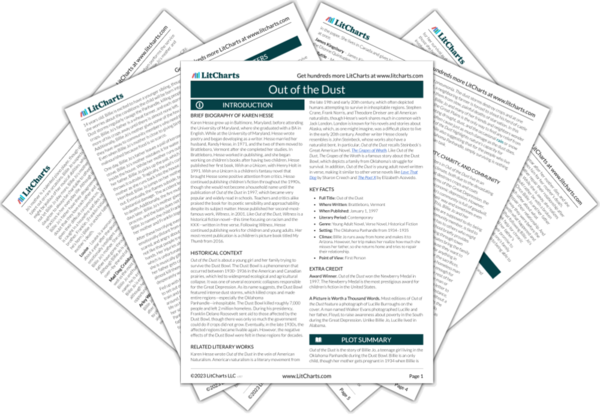The characters in Out of the Dust live in an inhospitable climate, both due to the devastating Dust Bowl that destroys crops and coats everything in dust, and in terms of the Great Depression, the United States’ most severe economic depression. However, despite their struggles, Billie Jo’s community is full of goodwill, with most people going out of their way and sometimes even risking their lives to help others. This, Billie Jo and her neighbors believe, is just what people are supposed to do: being a good person, and being a good community member, is tied to compassionately giving whatever one has to others who might need it more. For instance, Billie Jo’s school briefly provides food and shelter for a family that is passing through town looking for work. Billie Jo and her schoolmates bring the family clothes and toys and eat less at school because they want to ensure the family has food. They never ask for anything in return, and the family is incredibly grateful for the sacrifices. Later in the novel, Billie Jo gives her rations to a homeless man looking for work, even though she does not have enough for herself. After she goes to sleep, the man steals the rest of her food. However, Billie Jo does not get angry with the man or blame him. Instead, she does him a favor and sends a letter to his wife, letting her know the man is still alive. In this instance, Billie Jo acts selflessly to someone who wronged her without a second thought. She has no concern for herself—she acts the way she does because she believes it is the right thing to do. Her behavior is reflective of the community she grew up in as well as the novel’s view of charity; that is, charity is an act of empathy and compassion for one’s fellow human beings that leads with good intentions without asking for anything in return.
Poverty, Charity, and Community ThemeTracker

Poverty, Charity, and Community Quotes in Out of the Dust
My father used to say, why not put those hands to good use?
He doesn’t say anything about “those hands”
anymore.
Only Arley Wanderdale talks about them,
and how they could play piano again,
if I would only try.
Don’t forget us, they say.
But there are so many leaving,
how can I remember them all?
Mad Dog scooped a handful of dust,
like a boy in a sandpit.
He said, “I love this land,
no matter what.”
I looked at his hands.
They were scarless.











